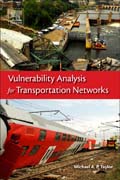
Vulnerability Analysis for Transportation Networks provides an integrated framework for understanding and addressing how transportation networks across all modes perform when parts of the network fail or are substantially degraded, such as extreme weather events, natural disasters, road crashes, congestion incidents or road repair. The book reviews the range of existing approaches to network vulnerability and identifies the application of each approach, illustrating them with case studies from around the world. The book covers the dimensions of time (hours, days, weeks, months and years), spatial coverage (national networks, regional areas, metropolitan and urbanized areas) and modes (road, urban public transport and national railway systems). It shows how the provided framework can be used to indicate the most suitable accessibility tools and metrics for a particular application. Vulnerability Analysis for Transportation Networks is for academics and researchers in transportation networks and for practicing professionals involved in the planning and management of transportation networks and services. Presents the most current, complete and integrated account of transport network vulnerability analysisIncludes numerous case studies from around the worldCompares alternative approaches to vulnerability analysis for multiple modes and the applicability of eachShows how academic transport network planning and management research development can be applied to actual practice, with special focus on socio-economic and environmental impacts INDICE: 1. Introduction 2. Critical infrastructure, Services, and Locations 3. Methods for Vulnerability Analysis 4. Network Performance Measures 5. Regional Development and Economic Planning 6. Case Studies 7. Integrated Framework for Vulnerability Analysis 8. Conclusion
- ISBN: 978-0-12-811010-2
- Editorial: Elsevier
- Encuadernacion: Rústica
- Páginas: 240
- Fecha Publicación: 01/08/2017
- Nº Volúmenes: 1
- Idioma: Inglés
